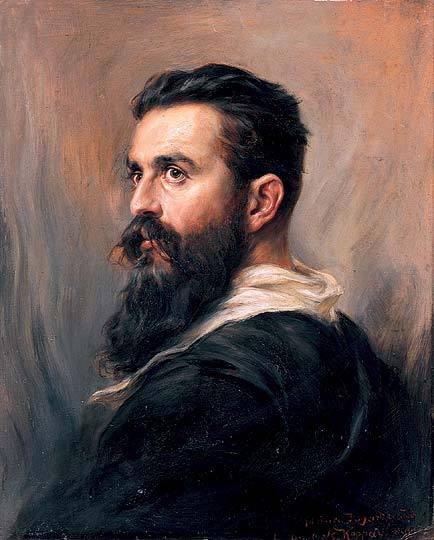
Theodor Herzl
That is a reference to Herzl's utopian novel "Altneuland" (The Old New Land), published in 1902, in which the author outlined his vision of the Jewish state and which is regarded as one of the founding texts of Zionism.
Herzl was born in the Pest part of Budapest on May 2, 1860. He studied law at the University of Vienna and worked as a correspondent in Paris for the Austrian newspaper, the Neue Freie Presse.
It was in Paris that Herzl followed the Dreyfus affair, a political scandal that divided France in the 1890s and early 1900s in which a Jewish captain, Alfred Dreyfus, was sentenced to life for alleged espionage.
The anti-Semitic attacks against Dreyfus led Herzl to reject early ideas of Jewish assimilation and to come to the belief that Jews should move out of Europe and set up their own state instead. And on his return to Vienna he penned the pamphlet "Der Judenstaat" (The Jewish State) in 1896.
The following year in 1897, Herzl organised the First Zionist Congress in Basel, Switzerland, where Palestine was named as the Jewish homeland for the first time and two years later, he set up the "Jewish Colonial Trust" to buy land in Palestine.
As president of the World Zionist Organisation (WZO), Herzl tried to win the support of the world powers for the idea of a Jewish state. Britain's offer for a settlement in Uganda was rejected by the Zionists in favour of Palestine.
Herzl's talks with German Emperor Wilhelm II, the Turkish Sultan Abdul Hamid II or Pope Pius X all proved fruitless, however.
Herzl died of cardiac sclerosis in Edlach, Lower Austria, on July 3, 1904.
In 1949, a year after the official creation of the state of Israel, Herzl's remains removed from Vienna and reburied on Mount Herzl in Jerusalem.
It is only recently that Israel has begun doing more to cultivate Herzl's memory and five years ago, his birthday was turned into national holiday.
This year, according to the Jewish calendar, his birthday fell on April 24. And in a special session of the Knesset, Israeli Prime Minister Benjamin Netanyahu praised Herzl as being one of the few people in history "who practically single-handedly saved his people from extermination."
Without Herzl, the state of Israel would not exist, Netanyahu said.
--------------------------------------------------------------------------
Herzl was born in the Pest part of Budapest on May 2, 1860. He studied law at the University of Vienna and worked as a correspondent in Paris for the Austrian newspaper, the Neue Freie Presse.
It was in Paris that Herzl followed the Dreyfus affair, a political scandal that divided France in the 1890s and early 1900s in which a Jewish captain, Alfred Dreyfus, was sentenced to life for alleged espionage.
The anti-Semitic attacks against Dreyfus led Herzl to reject early ideas of Jewish assimilation and to come to the belief that Jews should move out of Europe and set up their own state instead. And on his return to Vienna he penned the pamphlet "Der Judenstaat" (The Jewish State) in 1896.
The following year in 1897, Herzl organised the First Zionist Congress in Basel, Switzerland, where Palestine was named as the Jewish homeland for the first time and two years later, he set up the "Jewish Colonial Trust" to buy land in Palestine.
As president of the World Zionist Organisation (WZO), Herzl tried to win the support of the world powers for the idea of a Jewish state. Britain's offer for a settlement in Uganda was rejected by the Zionists in favour of Palestine.
Herzl's talks with German Emperor Wilhelm II, the Turkish Sultan Abdul Hamid II or Pope Pius X all proved fruitless, however.
Herzl died of cardiac sclerosis in Edlach, Lower Austria, on July 3, 1904.
In 1949, a year after the official creation of the state of Israel, Herzl's remains removed from Vienna and reburied on Mount Herzl in Jerusalem.
It is only recently that Israel has begun doing more to cultivate Herzl's memory and five years ago, his birthday was turned into national holiday.
This year, according to the Jewish calendar, his birthday fell on April 24. And in a special session of the Knesset, Israeli Prime Minister Benjamin Netanyahu praised Herzl as being one of the few people in history "who practically single-handedly saved his people from extermination."
Without Herzl, the state of Israel would not exist, Netanyahu said.
--------------------------------------------------------------------------









 Home
Home Politics
Politics









